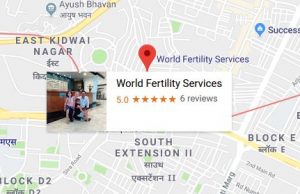Get Guaranteed IVF, Egg Donor and Surrogacy Services at Top 20 Countries – A World Fertility Services Promise
World Fertility Services Is Here to Assist with Your Successful Pregnancy
World Fertility Services– a leading and well-known destination for Successful IVF Treatments and Surrogacy
Infertility is not a mere word because the couple facing the condition has experience pain and helplessness. You should not feel sad or depressed because many people deal with infertility issues. The incapability of conceiving the baby stoles a person’s happiness and ability to raise a family. A child is the central part of happiness in a family, and some couples do not face any problems conceiving the baby. Some partners cannot become parents because of their severe health and infertility problems. So, can they ever conceive the child? Yes, through assisted reproductive techniques, you can successfully become a parent. Many procedures for different infertility concerns are present to manage conditions. IVF (In Vitro Fertilization), Egg Donor IVF and Surrogacy are the topmost in Assisted Reproductive Techniques that helps with many problems for pregnancy results. WORLD FERTILITY SERVICES has an extensive network of IVF and Surrogacy Centres across the world (has centres in 20 countries and expanding) to assist you with fertility solutions to have a baby of your own.We have the best IVF success rates in in over 20 countries that we work in with the help of leading technologies and assistance. The advanced methods and procedures help partners in different conditions. You can become a parent through the services of WFS. It does not matter which country or place you are in. You can select the best destination near or far from your house. We have centers and donor and surrogacy agencies in many countries. They perform treatments with top assistance to provide conception results. Our main motto is to deliver happiness to every family to help them in happy lives. Children are the best source of, and becoming parents is everyone’s dream.
You can have top-notch treatment according to conditions through World Fertility Services. We are the best destination for the first hope like IVF and the last hope like surrogacy. You can have highly experienced experts that try to deliver the best result for IVF with the processes like ICSI, PGD (Preimplantation Genetic Diagnosis), PICSI, IVM, SSR, and many more. We have high success rates in surrogacy, IVF, and various ART (Assisted Reproductive Techniques) that are touching the sky. We focus on patient comfort, satisfaction, and high success rates in the treatment. Our highly experienced experts and medical staff have the main motto to provide happiness.
We have Best IVF clinics in USA, UK, Dubai, Sharjah, Kenya, Ghana, India, Nepal, Kazakhstan, Turkey, Thailand, Cambodia, Argentina, Colombia, Mexico, Ukraine, Georgia and Armenia.
Our Top Surrogacy Centres are in USA, UK, Kenya, Ghana, India, Kazakhstan, Mexico, Ukraine, Georgia and Armenia.
Our top services ensure your parenthood dream comes true
Infertility issues can cause many problems in the couple’s life. As you need the topmost procedure with better attention. So, you do not face any issues in becoming parents. Thus, you require the best fertility clinic. Because it is the only way to achieve the best outcome for becoming parents. Their treatment journey may also have many ups and downs. Hence, the best assistance is the only way to manage your comfort and satisfaction. Here are our services to make the procedure much better:
-
Comprehensive Fertility Evaluations:
Our clinic provides all required tests and checkups in one place. We understand that fertility and IVF treatments involve various medical examinations. It is necessary to know the couple’s problems before starting the treatment. It helps them in having the best process for their health and infertility issues. So, you can get the best outcome in becoming a parent. As it helps in having personalized treatment as per needs.
-
Advanced methods:
IVF and other methods include the top services. Because IVF can add other procedures for better results. Since couples can get the best process as per problems. Many top-notch approaches and procedures are available. These help in having the best outcome in becoming parents. Hence, the couple can get a personalized process for their issue. It will help in making the couple’s process successful in pregnancy.
-
Other assistance:
Your IVF or other fertility treatment look-up ends here. After selecting us, you will not require to consult any other assistance. Because you can have all the needed facilities and services for fertility treatment. It helps in making the procedure much more comfortable for every couple. With it, they can also get the best service for top procedures to conceive the baby. Since, we have cryopreservation facilities, donor programs, genetic screening, and other services. This helps in having the best and most comfortable procedure.
-
Accuracy and privacy:
Our patients’ privacy is the most important aspect for us. We understand how hectic and difficult every couple’s journey can be. Hence, we focus on providing the best private services for every couple. Because it helps in maintaining their data safe with us. For it, we have top private consultation and waiting areas. Moreover, we try to highly focus on the laws and rules of every country for fertility treatment. With it, couples also get the best accuracy for their fertility procedure. Thus, our top fertility staff works closely with every patient.
It is the best time to pick the right place for your issue. All your worries can end here by choosing the best method. You can get every assistance and facility for having the most comfortable treatment. With it, you will also get top expertise, highly advanced technologies, and compassionate care. These help in increasing your chances of getting the best outcome. So, don’t let infertility stand in your dream of becoming a parents and having a healthy baby. And pick the right place for your better journey and results.
What Are the Types of Our Services?
You can have highly-VIP facilities and cares in every treatment at highly affordable charges. For your convenience, we have fully furnished centres with high infrastructure in many countries globally. We have highly advanced approaches and procedures for additional treatments. The following will be your benefits select us:
- Care: At World Fertility Services, We provide VIP care to every patient in their treatments. There is no cost to the VIP treatment! You have decided to become pregnant through ART so, you will get the process with highly successful and top-notch care. Your comfort and satisfaction are our priority to provide treatment and you to achieve top results. After selecting us, you will not require having other places for different processes. We are all in one destination for many treatments and procedures. For your assistance, we provide cost assistance and packages that help with affordable charges.
- Treatments: With WFS, Many treatments are present in one centre that decreases any problem. You will become parents or pregnant through the best process according to your conditions. Our top experts perform different tests and medical checkups before the procedure starts. It determines your infertility and health conditions to achieve the best approaches and cure. You can have various advanced treatments and techniques at every centre that increases the conception results. Many infertility conditions can manage with these treatments.
- Experts: At WFS Fertility Centres, Your treatment / Procedure will performed by highly experienced fertility experts, doctors, and specialists. Our Medical Team has high experiences and qualifications that provide better pregnancy results. The MD Doctors have more than 15-30 years of experience in Assisted reproductive techniques that help partners become parents. You will have these experts with well-behavior and highly overwhelming who never treat you as a mere patient and supports your moral system. We have top medical staff with high experience that always greet patients politely and provide every help possible.
- Locations: To make your treatment journey a little easy and comfortable, WFS has IVF, Egg Donor and Surrogacy centres in top 20+ countries. All centres and clinics have been built with advanced mechanisms and infrastructure. They have labs and high-tech technologies to perform treatments. These improvements form for your higher comfort and satisfaction during the treatment.
You must not select a place with fake promises or hidden expectations. Every couple is looking for treatments requires the best centre with top-notch assistance and highly reasonable charges. We ensure you never sink in the ocean, thus providing the best medical tourism company in the world. From choosing a course of treatment to bringing the baby home, they have a top-notch support staff to assist couples.
Our Affordable Fertility Treatments

Your Chances | Our IVF Success Rates IVF with Self Eggs
IVF with Donor Eggs
Our Success Rates with Surrogate Mother Surrogacy with Self Eggs
Surrogacy with Donor Eggs
What Are the Worldwide Fertility Treatments in Our Centres?
You can have various fertility treatments and surgeries according to different infertility issues. We have highly advanced facilities and approaches for your successful pregnancy results. Our experts and doctors perform treatments with state-of-the-art that provide conception or child results. Many treatments and procedures mean more comfort and successful outcomes for severe infertility problems.Where can you find Our IVF Clinics in the world?
Through WORLD FERTILITY SERVICES, we have made it possible for our patients to select the best location near them. You can have the best IVF clinic in the world in 2024 through us. We have centres in different destinations with fully furnished infrastructure, and highly experienced experts are present to perform treatments.
Ukraine has just 19 fertility treatment centres however is a mainstream goal for couples globally surrogacy, including IVF surrogacy, and for permitting more established ladies to end up pregnant as a consequence of egg gifts.
Where to Have Our Surrogacy Clinics Globally?
We have created a page that discusses the ideas surrounding receiving medical care overseas. Your process will function after consulting with your fertility specialist to know that surrogacy is the best option. After it, you should look for a surrogate to start. Surrogacy is a legally complex process for a couple and a surrogate mother. You must select the best locations according to your preference and availability of the process.
How Much Is the Affordable Cost of Fertility Treatments in Our Centres?
At the best IVF clinic in the world in 2024, World Fertility Services, we mean to put forward our every fertility service intentionally to suit our client’s expectations and requirements. Not only do we compose our services customer-centric, but also consider their costs to suit one’s pockets. World Fertility Services makes a comfortable cost to its every service, including IVF cost, Surrogacy cost, egg donor cost, and multi-attempt packages. World Fertility Services provides many more affordable charges for various treatments than in other countries. So belief in WFS has brought its every fertility treatment and surgery customer-oriented as well as one of the profiting options for people from overseas to get treatments inexpensively less than the cost in the US, UK, and Canada.
With no more words to add on, I have been speechless for WFS to have treated well my infertility condition, and now has been mother of a healthy child.

After the modern medical science to have been boon for people, I have been witnessed to have but at WFS in Tbilisi, Georgia, as this surrogacy centre has experienced me well of my motherhood.












 WhatsApp us
WhatsApp us